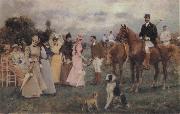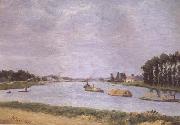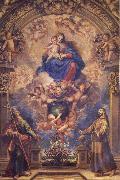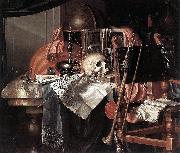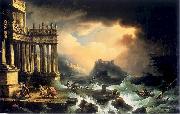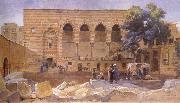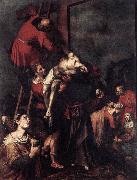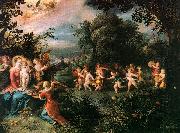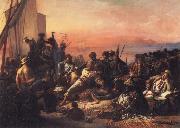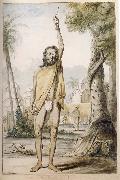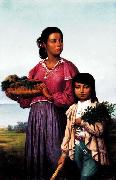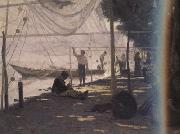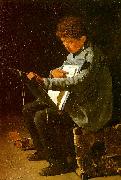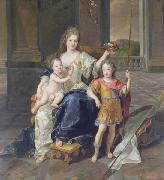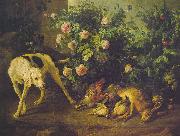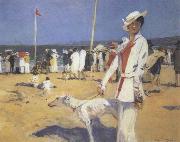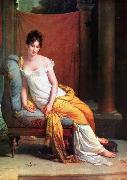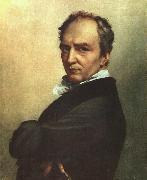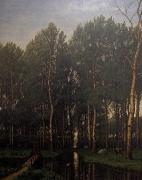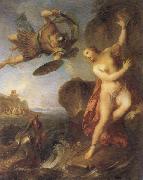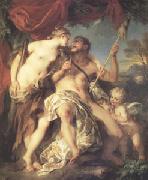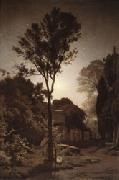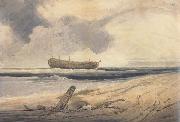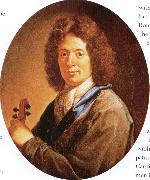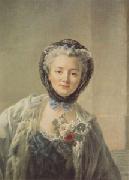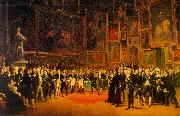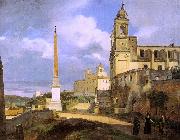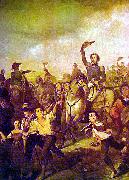|
|
|
|
|
|
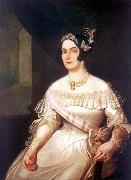 |
Francisco Pedro do Amaral
|
|
Amaral, Francisco Pedro do (1790 - 1831)
painted Portrait of Domitila de Castro Canto e Melo, Marquise of Santos in 19th century
|
|
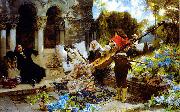 |
Francisco Pradilla Ortiz
|
|
(July 24, 1848 - November 1, 1921) was a prolific Spanish painter famous for creating historical scenes.
He was born in Villanueva de Gellego, near Zaragoza in Aragon, and studied initially in Zaragoza and then transferred to the Real Academia de Bellas Artes de San Fernando and the Academia de Acuarelistas in Madrid. In 1873, he won a scholarship to go to Rome. From there he had opportunities to travel to France and Venice and studied the old masters. In 1878 he submitted his painting Doña Joanna of Castile or (Juana la Loca) to the National Exhibition in Spain and was awarded the Medal of Honor. The Spanish Senate then commissioned him to create La Rendicien de Granada (The Surrender of Granada) that took him three years to complete (1882). In 1881 he became the Director of the Spanish Arts Academy in Rome, but resigned from this post after two years. He traveled, mostly in Italy, portraying local themes and people. In 1897 he returned to Madrid as the director of the Museo del Prado. He held this position only briefly and then focused again on painting.
His total output is well over 1,000 paintings showing his interest in a variety of subjects and styles, often without regard of the current fashion. He is primarily recognized for his historical paintings, the last one completed in 1910 carries one of the longer titles of a major painting, Cortejo del bautizo del Prencipe Don Juan, hijo de los Reyes Catelicos, por las calles de Sevilla (Retinue of the Baptism of Don Juan, son of the Catholic Monarchs, Along the Streets of Seville). Much more common, however, are costumbristaseoften romanticized studies that show local customs or mannerseand landscapes that are often sketchy, with impressionistic influences. Financial duress after the bankruptcy of his bank may have imposed a special need to be productive.
He died in Madrid in 1921 at the age of 73.
|
|
|
|
|
|
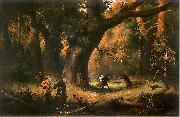 |
Franciszek Kostrzewski
|
|
(19 April 1826 in Warsaw - 30 September 1911 in Warsaw) was a Polish painter, illustrator and caricaturist.
He was born in Warsaw, Congress Poland, Russian Empire. Among his works are paintings illustrating the epic poem Pan Tadeusz. He died in Warsaw.
|
|
|
|
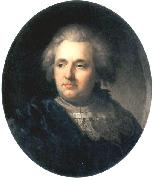 |
Franciszek Smuglewicz
|
|
(October 6, 1745 - September 18, 1807) was a Polish-Lithuanian draughtsman and painter. Smuglevičius is considered as a progenitor of Lithuanian art in the modern era.Some scholars consider him as a spiritual father of Jan Matejko's school of painting.[citation needed]. His brother was Antoni Smuglewicz.
Smuglewicz was born in Warsaw into a Polish-Lithuanian familyHis father, Łukasz Smuglewicz, also a painter, had moved to Warsaw from the province of Samogitia. In 1763 Franciszek journeyed to Rome, where he began the study of fine arts under the tutorship of Anton von Maron. He stayed in Rome for the next 21 years, where he embraced the Neo-Classical style.
In 1765 he received a royal scholarship from king Stanisław August Poniatowski and was admitted into the Saint Lucas Academy. As a colleague of Vincenzo Brenna he participated in cataloging artifacts from Nero`s Domus Aurea. In 1784 he returned to Warsaw, where he founded his own school of fine arts, one of the predecessors of the modern Academy of Fine Arts. |
|
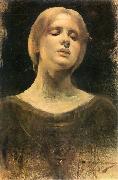 |
Franciszek zmurko
|
|
(18 July 1859 in Lviv - 9 October 1910 in Warsaw) was a Polish painter. Zmurko began drawing lessons as a young boy in his hometown with the painter Franciszek Tepa. As an adolescent he moved to Krakow to study at the The Academy of Fine Arts where he had lessons from Jan Matejko. In 1877 Zmurko moved to Vienna, Austria where he was accepted at the Vienna Academy, but left soon thereafter to study under Aleksander Wagner in Munich. Zmurko returned to Krakow in 1880 and then moved to Warsaw in 1882 where he remained until his death in 1910.
|
|
|
|
|
|
|
|
|
|
|
|
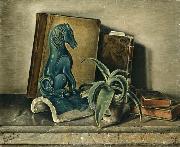 |
Francois Barraud
|
|
14 November 1899 - 11 September 1934) was a Swiss painter.
Barraud was the eldest of four brothers who all painted or sculpted at various points in their lives. The brothers, François, Aime, Aurele and Charles, were largely self-taught artists having been raised as professional plasterers and house painters.Barraud attended evening classes at the local art school in 1911 together with his brothers.In 1919, he exhibited his paintings in La Chaux-de-Fonds and participated in the National Exhibition of Fine Arts in Basel.Encouraged by the success of the exhibitions he left Switzerland in 1922, and moved to Reims in France where he worked as a house painter for two years. He married Marie, a French woman, in 1924. Marie subsequently featured as a model in several of his paintings. Around 1924 or 1925, Barraud found work in Paris as an artist and craftsman. While living in Paris he studied painting at the Louvre.
François Barraud painted mainly still lifes, female nudes and portraits, including several double portraits of himself and his wife, Marie His precise, realist style of painting developed under the influence of the old Flemish and French masters he had studied at the Louvre.
Barraud suffered periods of illness throughout his life and died of tuberculosis in Geneva, in 1934, at the age of 34.
Arthur Stoll held a major collection of François Barraud's works. His works are also held in the Musee des beaux-arts in La Chaux-de-Fonds, the Coninx Museum in Zurich and the Foundation for Art, Culture and History in Winterthur.
|
|
|
|
|
|
|
|
|
|
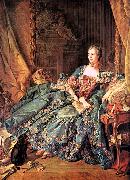 |
Francois Boucher
|
|
François Boucher (29 September 1703 - 30 May 1770) was a French painter, a proponent of Rococo taste, known for his idyllic and voluptuous paintings on classical themes, decorative allegories representing the arts or pastoral occupations, intended as a sort of two-dimensional furniture. He also painted several portraits of his illustrious patroness, Madame de Pompadour.
|
|
|
|
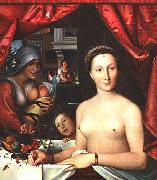 |
Francois Clouet
|
|
François Clouet (c. 1510 - 22 December 1572), son of Jean Clouet, was a French Renaissance miniaturist and painter, particularly known for his detailed portraits of the French ruling family.
|
|
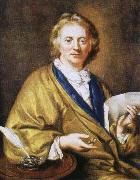 |
francois couperin
|
|
was a French Baroque composer, organist and harpsichordist. François Couperin was known as "Couperin le Grand" (Couperin the Great) to distinguish him from the other members of the musically talented Couperin family.
|
|
|
|
|
|
|
|
Francois Dumont
|
|
(1751-1831) was a French painter of portrait miniatures
Dumont was born at Lunville (Meurthe), and was left an orphan when quite young, with five brothers and sisters to support. He was for a while a student under Jean Girardet, and then, on. the advice of a Lunville Academician, Madame Coster, set up a studio for himself. In 1784 he journeyed to Rome, returning after four years careful study, and in 1788 was accepted as an Academician and granted an apartment in the Louvre. He married the daughter of Antoine Vestier, the miniature painter, and had two sons, Aristide and Bias, both of whom became painters.
Dumont was one of the three greatest miniature painters of France, painting portraits of Louis XVI, Marie Antoinette, Louis XVIII and Charles X, and of almost all the important persons of his day. His own portrait was engraved both by Francis Audouin and by Jean-Charles Tardieu.
He resided the greater part of his life in Paris, and there he died. A younger brother, Tony Dumont, was also a miniature painter, a pupil of his brother, a frequent exhibitor and the recipient of a medal from the Academy in 1810. Each artist signed with the surname only, and there is some controversy concerning the attribution to each artist of his own work. Tony was an expert violinist and delighted in painting portraits of persons who were playing upon the violin.
Many of Dumont's finest paintings came into the collection of J. P. Morgan, but others are in the Louvre, presented by the heir of Bias Dumont. The work of both painters is distinguished by breadth, precision and a charming scheme of coloring, and the unfinished works of the elder brother are amongst some of the most beautiful miniatures ever produced.
|
|
|
|
|
|
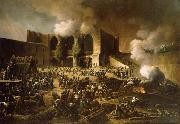 |
Francois Joseph Heim
|
|
(16 December 1787 - 29 September 1865) was a French painter.
He was born at Belfort. He early distinguished himself at the École Centrale of Strassburg, and in 1803 entered the studio of Vincent at Paris. In 1807 he obtained the first prize, and in 1812 his picture of "The Return of Jacob" (Musee de Bordeaux) won for him a gold medal of the first class, which he again obtained in 1817, when he exhibited, together with other works, a St John--bought by Vivant Denon.
In 1819 the "Resurrection of Lazarus" (Cathedral Autun), the "Martyrdom of St Cyr" (St Gervais), and two scenes from the life of Vespasian (ordered by the king) attracted attention. In 1823 the "Re-erection of the Royal Tombs at St Denis," the "Martyrdom of St Laurence" (Nôtre Dame) and several full-length portraits increased the painter's popularity; and in 1824, when he exhibited his great canvas, the "Massacre of the Jews" (Louvre), Heim was rewarded with the Legion of Honour.
In 1827 appeared the "King giving away Prizes at the Salon of 1824" (Louvre--engraved by Jazet) the picture by which Heim is best known and "Saint Hyacinthe." Heim was now commissioned to decorate the Gallery Charles X (Louvre). Though ridiculed by the romantists, Heim succeeded Regnault at the Institute in 1834, shortly after which he commenced a series of drawings of the celebrities of his day, which are of much interest.
His decorations of the Conference room of the Chamber of Deputies were completed in 1844; and in 1847 his works at the Salon "Champ de Mai" and "Reading a Play at the Theâtre Français" were the signal for violent criticisms. Yet something like a turn of opinion in his favour took place at the exhibition of 1851; his powers as draughtsman and the occasional merits of his composition were recognized, and toleration extended even to his colour.
Heim was awarded the great gold medal, and in 1855--having sent to the Salon no less than sixteen portraits, amongst which may be cited those of Cuvier, Geoffroy de St Hilaire, and Madame Hersent he was made officer of the legion of honour. In 1859 he again exhibited a curious collection of portraits, sixty-four members of the Institute arranged in groups of four.
Besides the paintings already mentioned, there is to be seen in Nôtre Dame de Lorette (Paris) a work executed on the spot; and the museum of Strassburg contains an excellent example of his easel pictures, the subject of which is a Shepherd Drinking from a Spring.
cjr |
|
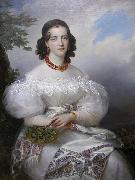 |
Francois Joseph Kinson
|
|
François-Joseph Kinson (1771-1839) was a Flemish painter.
Kinson attended art school at Bruges and soon established a reputation in Ghent and Brussels. He exhibited a portrait in Paris in 1799. Settling in Paris after the exhibition, the artist courted the favor of the rich and famous of the time. Kinson worked for Napoleones court and eventually became court painter to Jerôme Bonaparte, King of Westphalia. Kinson is best remembered for his portraits of elegant women. The artist worked as a court painter in Paris until 1830, and died in 1839 at the age of 68.
|
|
|
|
|
|
|
|
|
|
|
|
|
|
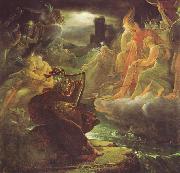 |
Francois Pascal Simon Gerard
|
|
12 March 1770 - 11 January 1837) was a French painter born in Rome, where his father occupied a post in the house of the French ambassador. His mother was Italian. As a baron of the Empire he is sometimes referred to as Baron Gerard. |
|
 |
Francois Pascal Simon Gerard
|
|
François Pascal Simon, Baron Gerard (12 March 1770 - 11 January 1837) was a French painter born in Rome, where his father occupied a post in the house of the French ambassador. His mother was Italian. As a baron of the Empire he is sometimes referred to as Baron Gerard.
|
|
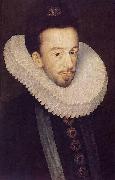 |
Francois Quesnel
|
|
(ca. 1543 - 1619) was a French painter of Scottish extraction.
The son of the French painter Pierre Quesnel and his Scottish wife Madeleine Digby, born in Edinburgh while his father worked for Mary of Guise, Quesnel found patronage at the French court of Catherine de Medici and her son, Henri III (illustration). He married Charlotte Richandeau, with whom he had four children. A widower, he remarried in 1584 Marguerite Le Masson, who gave him ten more children, among whom were Nicolas and Augustin, painters, and Jacques, bookseller.
Portrait, possibly of Catherine-Charlotte de la Tremoille, ca 1589, attributed to QuesnelIn Paris he worked as a decorator and a designer of cartoons for tapestry, but it is as a portrait painter, both in oils and in delicately tinted pencil or red and black chalk he is chiefly remembered. Some portraits were engraved by Thomas de Leu and Michel Lasne, and in 1609 he drew a map of Paris for engraving by Pierre Vallet. He died in Paris.
|
|
|
|
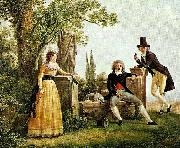 |
francois sablel
|
|
Jean ISABEL and Marie Charlotte BACON. She was married to Jean Baptiste BLANCHETTE on Feb 27 1775 in St. Pierre, Quebec |
|
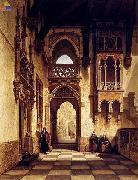 |
Francois Stroobant
|
|
Francois Stroobant (14 June 1819 Brussels - 1 June 1916 Elsene) was a Belgian painter and lithographer, and brother of the lithographer Louis-Constantin Stroobant (1814-1872) noted for his part in Flore des Serres et des Jardins de l'Europe.
He attended the Brussels Academie des Beaux-Arts between 1832 and 1847, studying under Francois-Joseph Navez, Paul Lauters and Francois-Antoine Bossuet (1798 - 1889). In 1835 he worked in the studio of the lithographer Dewasme-Pletinckx in Brussels.
Stroobant's subjects were mainly landscapes and architecture. He travelled extensively through the Netherlands, France, Germany, Switzerland, Italy, Spain and Hungary, exhibiting in the galleries of the Belgian towns Ghent, Antwerp and Brussels. His romantic painting style stayed constant throughout his career. He was founder and first director in 1865 of the Academie des Beaux-Arts at Sint-Jans-Molenbeek in Brussels.
|
|
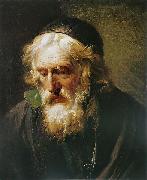 |
Francois-Andre Vincent
|
|
(December 30, 1746 - August 4, 1816) was a French neoclassical painter.
He was the son of the miniaturist François-Elie Vincent and studied under Joseph-Marie Vien. He travelled to Rome, where he won the Prix de Rome in 1768. From 1771 to 1775 he studied there at the Academie de France.
In 1790 Vincent was appointed master of drawings to Louis XVI of France, and in 1792 he became a professor at the Academie royale de peinture et de sculpture in Paris. In 1800 he married the painter Adelaïde Labille-Guiard.
Belisarius by François-Andre Vincent, painted 1776. He was a leader of the neoclassical and historical movement in French art, along with his rival Jacques-Louis David, another pupil of Vien. He was influenced by the art of classical antiquity, by the masters of the Italian High Renaissance, especially Raphael, and among his contemporaries, Jean-Honore Fragonard.
He was one of the founder members of the Academie des beaux-arts part of the Institut de France and the successor to the Academie royale in 1795. |
|
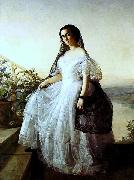 |
Francois-Auguste Biard
|
|
(June 30, 1799 - June 20, 1882) was a French genre painter.
Born at Lyon, he traveled around the world, sketching on the way. He was particularly successful in rendering burlesque groups.
His painting, Scenes on the Coast of Africa, depicted on the right, was the inspiration behind Isaac Julien's short film The Attendant (1993). Biard was a known abolitionist against the Atlantic slave trade.
Wikimedia Commons has media related to: Auguste François Biard
This article incorporates text from the public domain 1907 edition of The Nuttall Encyclopædia.
|
|
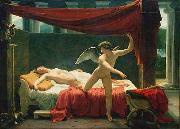 |
Francois-Edouard Picot
|
|
(10 October 1786 - 15 March 1868) was a French painter during the July Monarchy, painting mythological, religious and historical subjects.
|
|
|
|
|
|
|
|
|
|
|







